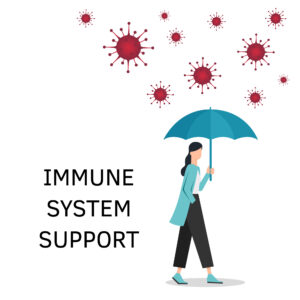Author: Dr. Stephen Chaney
 I am often asked whether you can trust supplements purchased on Amazon. I have avoided answering that question publicly because I don’t wish to have any legal issues with Amazon.
I am often asked whether you can trust supplements purchased on Amazon. I have avoided answering that question publicly because I don’t wish to have any legal issues with Amazon.
However, I recently came across a published study (C Crawford et al, JAMA Network Open. 2022;5(8):e2226040 ) that partially answers that question. Normally, I review and comment on articles I share. However, today I will only use direct quotes from the article without comment to avoid any personal legal jeopardy.
Why Was The Study Done?
In the words of the authors,
 “Cold, flu, and immunity supplement sales have skyrocketed since the start of the COVID-19 pandemic…Supporting immunity or boosting the immune system has become an important reason for using dietary supplement products even though some of the claims may be misleading or not scientifically accurate. In addition, information regarding whether there are any risks associated with such products and ingredients is lacking.”
“Cold, flu, and immunity supplement sales have skyrocketed since the start of the COVID-19 pandemic…Supporting immunity or boosting the immune system has become an important reason for using dietary supplement products even though some of the claims may be misleading or not scientifically accurate. In addition, information regarding whether there are any risks associated with such products and ingredients is lacking.”
“The growth in e-commerce, sales, and manufacturing of dietary supplements, coupled with the limited resources for regulating dietary supplements, has created a challenge in keeping up with the market. Adulteration, misbranding, and misleading claims are regularly reported.”
“Since December 2020, Amazon has been requiring sellers to provide outlined quality control documentation and a certificate of analysis (testing results) for supplements sold on that platform. These new requirements could help ensure products are less risky and not adulterated.”
“In this case series, 30 products…marketed to support and boost the immune system…were selected and purchased from Amazon since the introduction of the new requirements by Amazon in December 2020. We tested the products to determine whether their product labels were accurate and whether any product was misbranded or adulterated.”
How Was The Study Done?
In the words of the authors,
“On the Amazon website, we searched the key word immune in ‘all departments’ and then sorted results by ‘featured’. The first 30 dietary supplement products that appeared as results with 4 or more stars [highest rated] were eligible and selected for analysis in May 2021.”
“One sample of each selected product was purchased and sent to the University of Mississippi’s National Center for Natural Product’s Research for product analysis. Liquid chromatography-mass spectrometry was used to determine the quality of the 30 dietary supplement products…The list of ingredients detected through analysis for each product was compared with the ingredients on the product’s Supplement Facts label to determine whether the product’s label was accurate.”
What Did The Study Show?
In the words of the authors,
![]() “Seventeen of the 30 products tested had inaccurate labels based on the product analysis. Of the 17 products with inaccurate labels:
“Seventeen of the 30 products tested had inaccurate labels based on the product analysis. Of the 17 products with inaccurate labels:
- 13 had ingredients listed on the labels that were not detected through analysis, such that their labels were misbranded. Ingredients missing from products ranged from 1 to 6 ingredients from any single product.
- Nine products had substances detected but not claimed on the product label…some of which may be considered adulterated. [For example] One ingredient not claimed on the label but found in 3 products marketed as containing elderberry was Orza sativa (black rice seed).
- Five [products] were misbranded and contained additional components not claimed on the label.”
“The 30 immune health dietary supplements tested and analyzed had claims related to immune support, immune defense, and bolstering of the immune system.
- Examples of such claims included “all seasons immune support”, “immune strengthening ingredients,” “a powerhouse immune system booster”, and “booster up your immune system”.
- Fifteen of the products tested additionally had scientific sounding claims by using terms such as “research-based” or “research supported”, “clinically studied”, “scientifically proven”, “supported by…gold-standard clinical studies,” and “backed by science.”
“The price of these products ranged from $11.93 to $90.48 for an approximate 30-day supply with the median cost of $25.33 per month…The mean price of the 17 products scoring less than 4 [This is a different scoring system than the one used on the Amazon website. It is a scoring system based on the quality of the product. Less than 4 represents lower quality products] was approximately $25 for a 30-day supply, and the mean price for those scoring 4 or more [higher quality products] was $31.”
What Did The Authors Say About The Results?
“Dietary supplements, which consumers buy to improve their health can be costly…The public has a right to know that they are buying what is stated on the label when spending money on dietary supplements. This is certainly not always the case, as we found that only 13 of the 30 products were accurate…Although we cannot assume any product will confer a benefit, we would certainly not expect any harm; however, there is a risk that misbranded and/or adulterated products could cause harm.”
“Claims made on the labels of most dietary supplement products [in this study] seem to stretch what would be considered as allowable claims, which can by statute and/or FDA regulations be made for dietary supplements. Some other claims sounded scientific but did not have any peer-reviewed publication cited. Therefore, it is unknown how or whether these claims were substantiated.”
The Bottom Line
The authors concluded,
“This case series analysis suggests that quality control measures have not been sufficient for most immune health dietary supplements advertised and sold on the Amazon website. Moreover, some claims made on most of these immune support products do not appear consistent with any of the categories of claims defined by FDA regulations. Most products tested had inaccurate labels, and the claims made on these labels may mislead consumers into purchasing products when information on whether they are actually beneficial is limited. Consumers should be aware that these products may potentially not contain what is stated on the label.”
For more details on this study, read the article above.
These statements have not been evaluated by the Food and Drug Administration. This information is not intended to diagnose, treat, cure, or prevent any disease.


